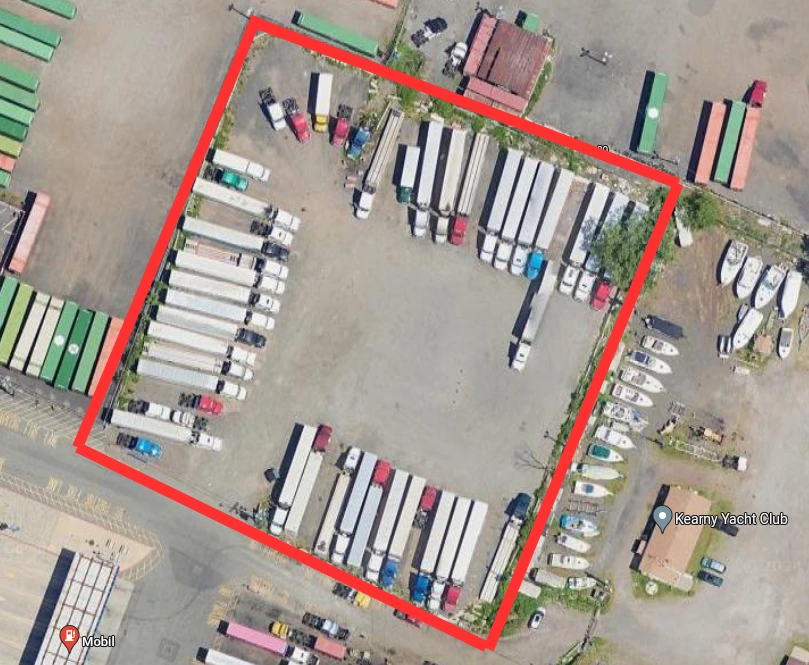Last week, I talked to a guy who owns several truck stops, a diesel fuel wholesaling company, and a portfolio of industrial real estate. He told me that he could buy truck parking lots and rent them at a cap rate of 8% per year… in New Jersey! That’s a better return than I can get on single family rentals in south Florida, and with none of the property maintenance headaches (he’s literally renting out land).

I went down the rabbit hole and discovered 3 things:
- The vast majority of trucking parking lots in the U.S. are small (1-5 acre) lots that are owned by mom and pop investors,
- There is rapidly growing institutional interest in buying truck parking lots, and
- Institutions are having difficulty investing in truck parking lots because the market is so fragmented and there are very few large portfolios available for them to buy.
I immediately start daydreaming about rolling up small truck parking lots at high cap rates, bundling them together, and then selling them off as a lower cap rate portfolio to some industrial REIT.
Since cities want the tax dollars from expensive properties, they tend not to approve the demolition of existing industrial buildings if there is no plan to replace them. That means the supply of land in dense urban areas is slowly being diminished, without replacement. So truck parking lots in large cities have a strong business moat & limited competition.
But my daydream gets even better. The average home insurance premium in Florida rose 42% from 2022 to 2023, and a similar story is true for commercial and industrial real estate in Florida. That means good real estate investments in Florida are hard to come by right now. Except… truck parking lots are not buildings… The cost of property insurance for these lots is minuscule compared to the revenue they bring in. You still need general liability insurance, but the cost of that insurance hasn’t been driven up by hurricanes, tornadoes, and roofing fraud to the same degree that the cost of property insurance has been.
So here’s the strategy:
- Buy up small 1-5 acre parcels of industrial zoned land in Miami (these lots are too small for most brokers to care about and are frequently not listed on costar, which means there is serious potential to buy mispriced assets).
- Choose land with easy access to nearby highways, the cargo port, the airport, and/or large distribution centers, since that is where the highest demand for truck parking is.
- Also try to find land that is in the path of development so that when I’m ready to sell, I can stoke a bidding war between industrial REITS and industrial developers who want to buy the land.
- Regrade the land if necessary, finish with gravel or pavement, and set up fences & cameras for security.
- Rent out the land. Minimize vacancy by finding short term tenants on Truck Parking Club (basically Airbnb for truck parking) between my longer term tenants.
And in fact, my pool of potential tenants is actually much larger than just truckers. Construction companies need industrial land to store heavy equipment. Contractors need to store bulk materials. And logistics companies need to store shipping containers. That’s why institutional investors have started calling these industrial land parcels “industrial outdoor storage” (IOS) instead of truck parking lots. IOS is a $200 billion market in the U.S.
One major hiccup in the IOS roll-up strategy though is financing. Many banks won’t finance raw industrial land, especially if the land is not already generating cash flow. And rolling up enough lots to be interesting to an institutional investor would take tens of millions of dollars. That’s a lot of fundraising.
Also, because you don’t have to do much to turn land into a parking lot, it’s questionable whether an IOS roll-up could benefit from my favorite real estate tax strategy: opportunity zones. That’s a shame because a lot of industrial land in Miami is already in an opportunity zone.
Still, the combination of strong moat / limited competition, diminishing supply, increasing demand, low insurance costs, and lots of institutional buyers willing to buy a roll-up at a higher cap rate than I can buy individual lots makes the business of truck parking compelling enough for me to dig into more. Next week I’ll be publishing a podcast interview with the New Jersey truck stop owner I mentioned before, but if you happen to know anyone who owns IOS lots in Miami specifically, I’d love an introduction.